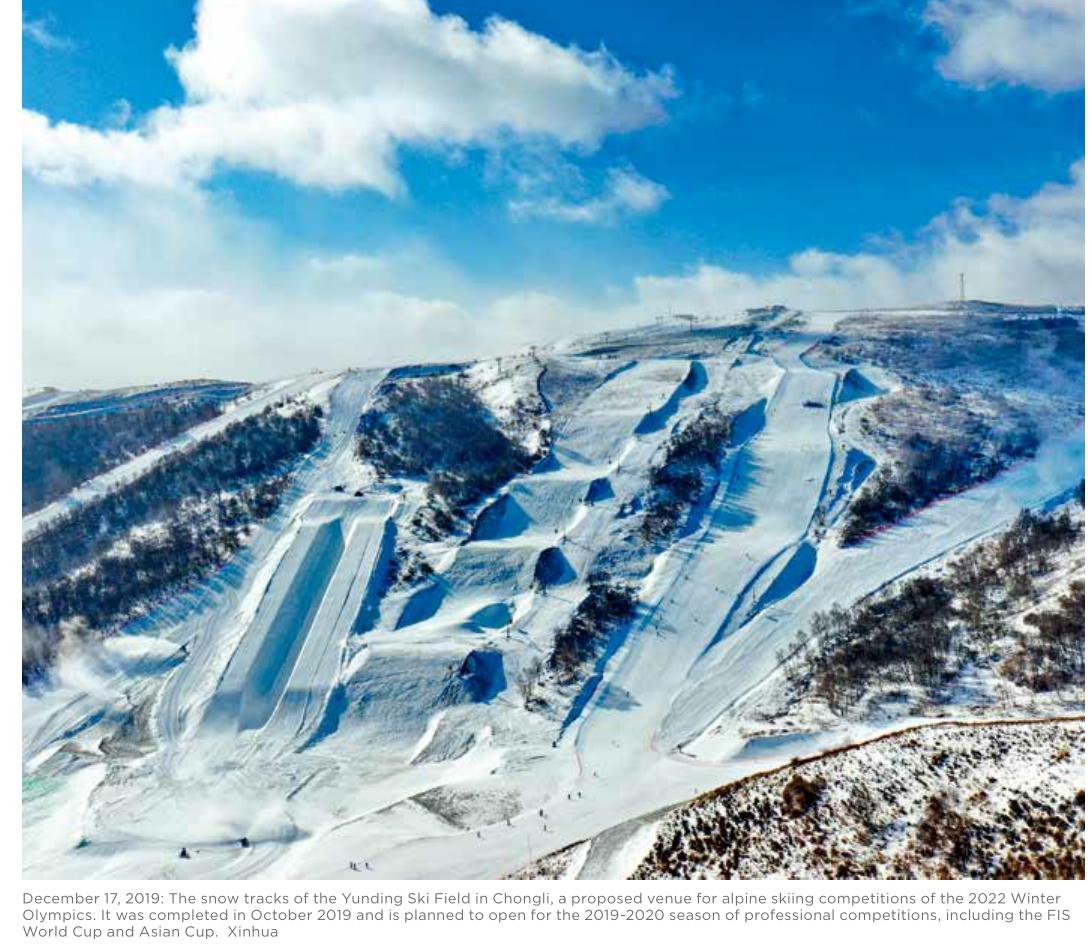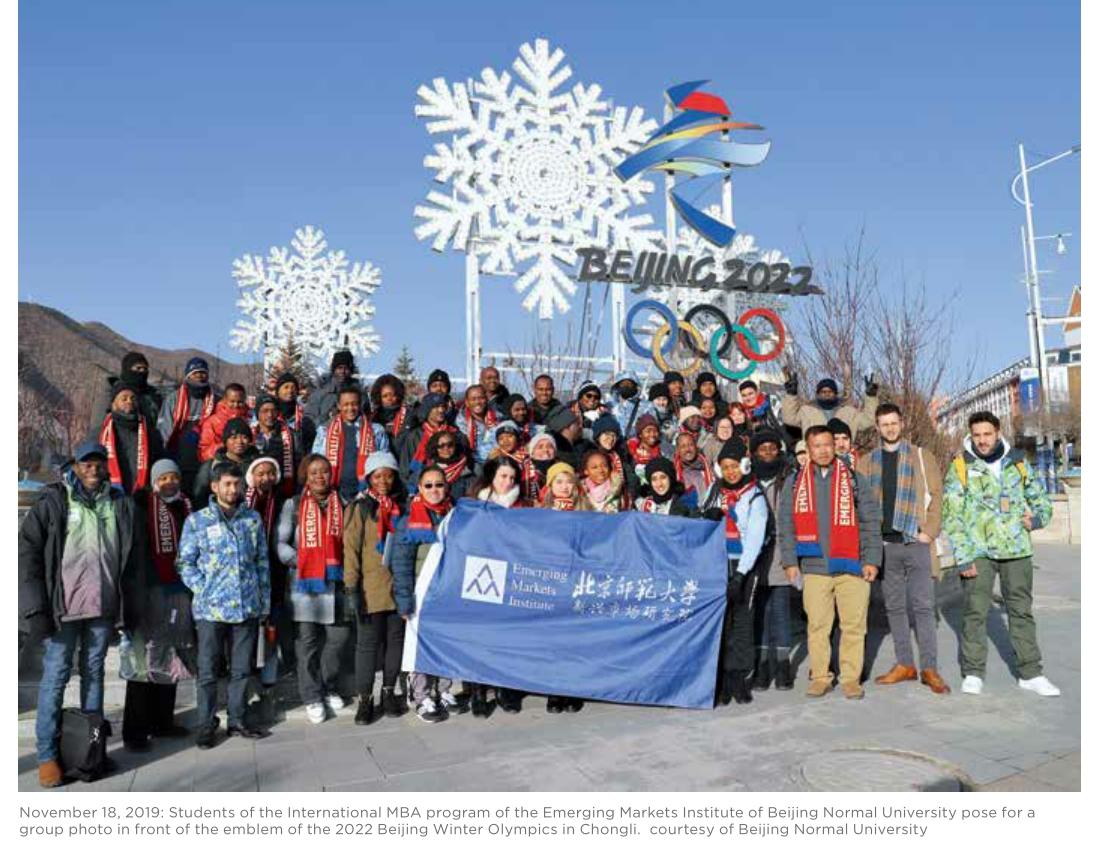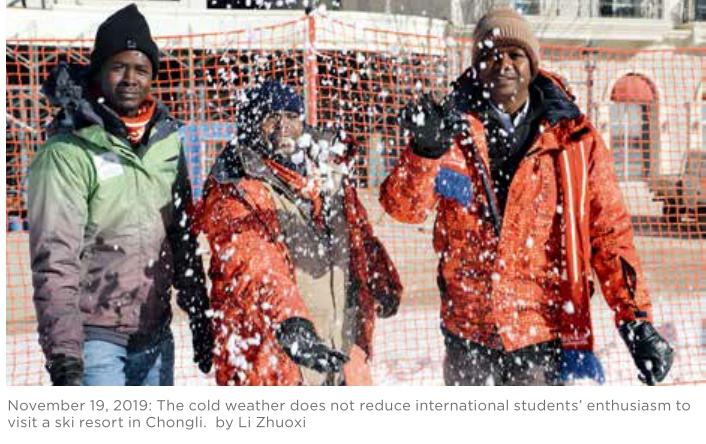Fresh Snow in Chongli
2020-02-10byLiZhuoxi
by Li Zhuoxi

When International Olympic Committee(IOC) presi dent Thomas Bach revealed Beijing as the winner of the 2022 Winter Olympics bid on July 31, 2015, Chongli, the host of skiing and biathlon events at the Winter Olympics, celebrated with fireworks that lasted for more than 20 minutes. “People embraced each other and shed tears of joy,” recalled Liu Jie, a guide at the Ice and Snow Museum in Chongli.
With about 126,000 residents, Chongli District in the suburb of Zhangjiakou City, northern Chinas Hebei Province, was known to only a few before the bidding success. Its unique geographical location and climate conditions make Chongli an ideal place to host the skiing and biathlon events of the 2022 Winter Olympics. Local residents consider ice and snow Mother Natures greatest gift.
In November 2019, a total of 50 government officials from 26 developing countries arrived in Chongli to investigate the local economic development, industrial activity, poverty reduction and urbanization efforts.
The tour was organized for those enrolled in the one-year International MBA program of the Emerging Markets Institute(EMI) of Beijing Normal University(BNU). The program was jointly launched by Chinas Ministry of Commerce and Ministry of Education in 2014 to train senior economic and trade officials and management elites for developing countries. By the end of 2018, the program had trained 182 students from 61 developing countries.
A Natural Gift
Located about 200 kilometers northwest of Beijing, Chongli will host all skiing and biathlon events of the 2022 Winter Olympics.
Before 2014, Chongli was a national-level poverty-stricken county, with its mountainous areas covered by snow much of the year.
“It can be hard to open the door on snowy days,” described Gao Junsheng, a resident of Shangwopu Village in Chongli.
He noted that in the past, heavy snow seriously affected local peoples lives in winter. They had never thought that snow, which caused so much inconvenience and trouble, would one day fuel the development of the local economy.
In the eyes of industry insiders, Chongli is one of the most ideal places to develop skiing in China. It snows early and heavily there, and the average temperature in winter can drop to as low as minus 20 degrees Celsius. The long, cold winter helps annual snowfall accumulate to over a meter deep and the mountainous landscape features ideal slopes for skiing.
In 1996, Saibei Ski Resort, the first privately-owned ski resort in China, was built in Chongli despite extremely difficult conditions.
“Most of the skiing equipment was donated by international friends,” recalled Shan Zhaojian, secretary general of the Chinese Ski Association. “To build a 300-meter ski track, we had to hire local villagers to carry snow up the mountain with bags on their backs and then pack it down with spades.”
Historic Opportunity
Thanks to the rapid development of the ice and snow industry and the implementation of targeted poverty alleviation policies, Chonglis economy has gradually improved, with the overwhelming majority of local people being lifted out of poverty in recent years. When the news broke in July 2015 that Beijing and Zhangjiakou won a joint bid to host the 2022 Winter Olympic Games, Chongli drew global attention overnight, which gave a sharp boost to the local economy.
Chongli is now home to seven well-known large ski resorts with 169 ski tracks totaling 162 kilometers. Radiating from Taizicheng Village, the resorts have become one of Chinas major ski clusters.
According to statistics released by the local government, the 2022 Winter Olympics have helped Chonglis fiscal revenues grow rapidly by nearly 200 million yuan(US$29 million) per year. In 2018, it exceeded 1 billion yuan (US$143 million) and general public budget revenues surpassed 500 million yuan (US$71.5 million) for the first time. Nearly 30,000 local people directly or indirectly work for the snow resorts.
With historic opportunities after the bidding success, a series of Olympic facilities are scheduled for construction including a 116-kilometer expressway linking Yanqing District of Beijing to Chongli District of Zhangjiakou and the Beijing-Zhangjiakou High-speed Railway which can cut the travel time between the two cities to only 50 minutes.
In addition to IOC requirements, construction of a one-hour traffic circle is especially important to the local economy of Chongli.“When we first visited Chongli, the trip from Beijing took seven hours as the bus crossed many mountains and rivers,” described a skier named Tina. “In 2015, the ZhangjiakouChengde Expressway opened, which greatly shortened the travel time to three and a half hours. Completion and opening of the YanqingChongli Expressway and the BeijingZhangjiakou High-speed Railway will make the trip even faster.”
The rich natural endowments of Chongli make it worth visiting throughout the year. Flowers blossom in spring, the region provides an escape from heat in summer, the autumn scenery is especially stunning, and winter is ideal for skiing. According to Wang Sizhou, deputy secretary of Chonglis Party committee, the district government is planning to capitalize on the local natural resources to develop year-round tourism and a resort industry based on the development of winter resorts. In the future, recreational activities such as mountain bike sports, camping and hiking will become popular summer travel programs in Chongli, he added.
Ork Srey Pov, secretary general of the Cambodian Senate, chose the word “incredible” to describe the tour. “Without seeing the development of Chongli with my eyes, I would not have believed the big changes happening here,” she remarked. “Its hard to imagine a poor town transforming into such a spectacular ice and snow industry base. The continuous investment of funds and human capital can produce a multiplier effect that will enable Chongli to remain an attractive destination for investors even after the Winter Olympics.”
Shaking off Poverty
On May 5, 2019, the government of Hebei Province officially removed 18 county-level cities including Chongli from the list of poverty-stricken counties and districts in the province. That change made Chongli worth investigating for the International MBA program.
To gain deeper understanding of Chonglis urbanization and poverty alleviation achievements, the trainees also visited Shangwopu Village, 10 kilometers northeast of the government seat of Chongli District.
Just three years ago, most villagers lived in dilapidated houses, subsisted on farming and herding, and had to travel outside the area to earn any money. In 2017, the village was included in the districts Beautiful Village construction plan. The local government cooperated with Forlong Group, a local enterprise, to build new houses equipped with water, electricity and heating facilities next to the old village. Since then, Shangwopu has become a modern village.
The visitors gained a deeper understanding of the change by talking with local officials and representatives from local enterprises like Forlong Group.
Abudu Michel Saeed, a research assistant at the Ministry of Business Development of Ghana, realized that aid from private enterprises is incredibly helpful to governmental efforts to fight poverty.
“Chinas experience is worth learning in our country and other underdeveloped countries,”Saeed said.
Mukubunda Elijah Liseli, chief information officer of the Ministry of Trade and Industry of Namibia, called the change in Chongli huge. He was impressed by the centripetal forces of Chinese people who do great things together. “Chongli will boom, and after 10 years of development it will be far better than it is today,” Liseli said.